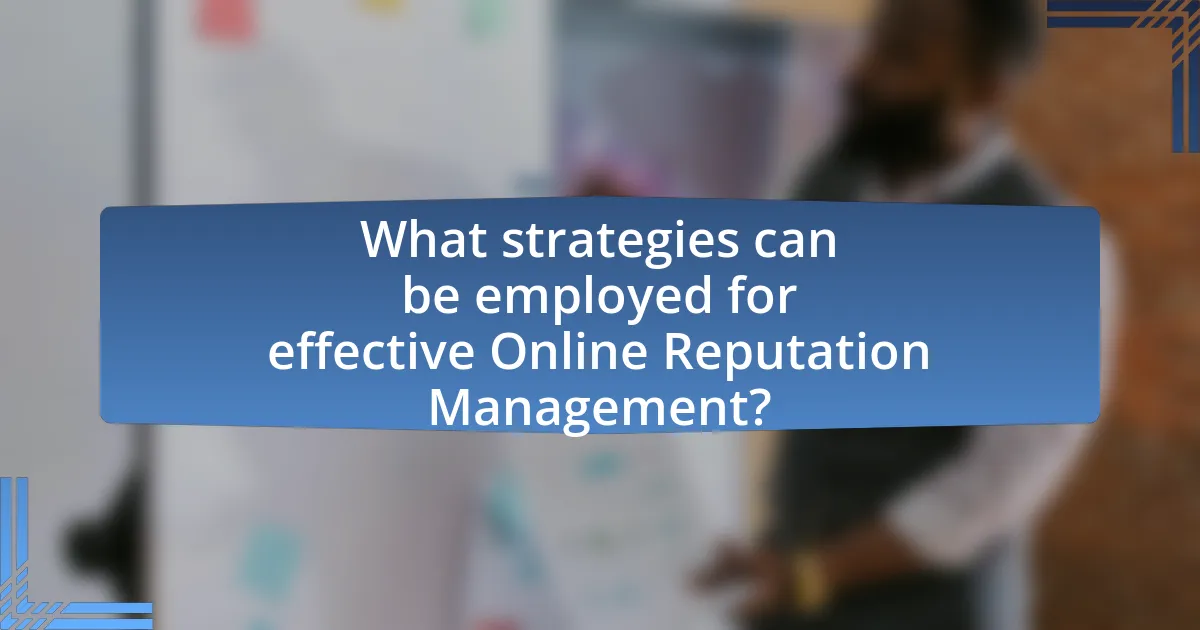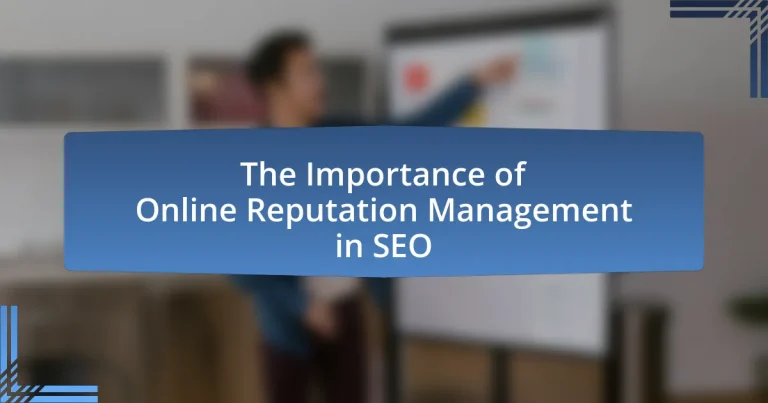Online Reputation Management (ORM) in SEO is the practice of monitoring and influencing an individual or organization’s online presence to shape public perception. The article outlines how ORM impacts SEO performance by enhancing brand credibility through positive reviews and high-quality content, which can improve search engine rankings. Key elements of ORM include monitoring online mentions, responding to feedback, and creating positive content, all of which are essential for maintaining a favorable reputation. The article also discusses the risks businesses face without effective ORM, the importance of engaging with customers, and strategies for managing online reputation to foster trust and improve SEO outcomes.

What is Online Reputation Management in SEO?
Online Reputation Management (ORM) in SEO refers to the practice of monitoring, influencing, and managing an individual’s or organization’s online presence to shape public perception. ORM involves strategies such as search engine optimization techniques, content creation, and social media engagement to ensure positive information ranks higher in search results, thereby mitigating the impact of negative reviews or misinformation. Research indicates that 70% of consumers trust online reviews as much as personal recommendations, highlighting the critical role ORM plays in shaping brand reputation and consumer trust in the digital landscape.
How does Online Reputation Management influence SEO performance?
Online Reputation Management (ORM) significantly influences SEO performance by shaping how a brand is perceived online, which directly affects search engine rankings. Positive reviews and high-quality content associated with a brand enhance its credibility, leading to improved visibility in search results. According to a study by Moz, approximately 13% of Google’s ranking factors are related to online reputation, including review signals and brand mentions. Furthermore, a strong online reputation can lead to increased click-through rates, as users are more likely to engage with brands that have favorable reputations. This correlation between ORM and SEO performance underscores the importance of actively managing online perceptions to achieve better search engine outcomes.
What are the key elements of Online Reputation Management?
The key elements of Online Reputation Management (ORM) include monitoring, responding, and improving online presence. Monitoring involves tracking mentions of a brand across various platforms to identify public perception. Responding requires addressing negative feedback and engaging with customers to build trust. Improving online presence focuses on creating positive content, such as testimonials and case studies, to enhance the brand’s image. These elements are essential for maintaining a favorable reputation, which can significantly impact search engine rankings and overall SEO performance.
How do online reviews impact search engine rankings?
Online reviews significantly impact search engine rankings by influencing both local SEO and overall visibility. Search engines like Google consider the quantity, quality, and recency of reviews as key ranking factors, as they reflect the credibility and relevance of a business. For instance, a study by Moz indicates that online reviews account for approximately 15% of local search ranking factors, highlighting their importance in determining a business’s position in search results. Additionally, positive reviews can enhance click-through rates, further boosting rankings due to increased user engagement.
Why is Online Reputation Management crucial for businesses?
Online Reputation Management (ORM) is crucial for businesses because it directly influences consumer trust and purchasing decisions. A positive online reputation can lead to increased customer loyalty, higher sales, and improved brand perception. According to a survey by BrightLocal, 87% of consumers read online reviews for local businesses, and 73% trust a business more if it has positive reviews. Furthermore, businesses with a strong online reputation are more likely to rank higher in search engine results, enhancing their visibility and attracting more customers. Thus, effective ORM not only protects a brand’s image but also contributes significantly to its overall success in the digital marketplace.
What risks do businesses face without effective Online Reputation Management?
Businesses face significant risks without effective Online Reputation Management, including loss of customer trust, decreased sales, and damage to brand image. When a business fails to monitor and manage its online reputation, negative reviews or misinformation can proliferate, leading to a decline in consumer confidence. According to a study by BrightLocal, 87% of consumers read online reviews for local businesses, and 79% trust online reviews as much as personal recommendations. This indicates that a poor online reputation can directly impact a business’s ability to attract and retain customers. Furthermore, negative perceptions can lead to reduced search engine rankings, as search algorithms increasingly consider user-generated content and reviews in their ranking criteria. Thus, neglecting Online Reputation Management can result in long-term financial and reputational harm to a business.
How can a positive online reputation enhance customer trust?
A positive online reputation enhances customer trust by demonstrating reliability and credibility. When potential customers encounter favorable reviews, testimonials, and consistent positive interactions online, they perceive the business as trustworthy. Research indicates that 84% of people trust online reviews as much as personal recommendations, highlighting the significant impact of a positive digital presence on consumer confidence. Furthermore, businesses with strong online reputations often experience higher customer loyalty and increased sales, as consumers are more likely to engage with brands they trust.

What strategies can be employed for effective Online Reputation Management?
Effective Online Reputation Management (ORM) strategies include monitoring online mentions, engaging with customers, and creating positive content. Monitoring involves using tools like Google Alerts and social media listening platforms to track brand mentions and sentiment. Engaging with customers through timely responses to reviews and comments fosters trust and demonstrates commitment to customer satisfaction. Creating positive content, such as blog posts, testimonials, and case studies, helps to build a favorable online presence and push down negative search results. According to a 2021 study by BrightLocal, 87% of consumers read online reviews for local businesses, highlighting the importance of actively managing online reputation to influence consumer decisions.
How can businesses monitor their online reputation?
Businesses can monitor their online reputation by utilizing tools such as social media monitoring software, online review platforms, and Google Alerts. These tools allow businesses to track mentions of their brand across various online channels, including social media, review sites, and news articles. For instance, platforms like Hootsuite and Brandwatch provide analytics on customer sentiment and engagement, enabling businesses to respond promptly to negative feedback. Additionally, Google Alerts can notify businesses whenever their name or relevant keywords are mentioned online, ensuring they stay informed about their reputation in real-time. This proactive approach is essential, as studies show that 84% of people trust online reviews as much as personal recommendations, highlighting the impact of online reputation on consumer behavior.
What tools are available for tracking online mentions and reviews?
Tools available for tracking online mentions and reviews include Google Alerts, Mention, Brand24, Hootsuite, and Sprout Social. Google Alerts allows users to set up notifications for specific keywords, enabling them to monitor mentions across the web. Mention provides real-time monitoring of brand mentions across social media and online platforms. Brand24 offers analytics on mentions and sentiment analysis, helping businesses gauge public perception. Hootsuite and Sprout Social are social media management tools that also track mentions and reviews, providing insights into audience engagement and brand reputation. These tools are widely used for effective online reputation management, which is crucial for SEO success.
How often should businesses assess their online reputation?
Businesses should assess their online reputation at least quarterly. Regular assessments allow companies to monitor changes in public perception, respond to negative feedback promptly, and adapt their strategies accordingly. According to a study by the Reputation Institute, 70% of consumers are influenced by online reviews, highlighting the importance of frequent evaluations to maintain a positive image and enhance SEO efforts.
What role does content creation play in Online Reputation Management?
Content creation is essential in Online Reputation Management (ORM) as it shapes public perception and influences search engine results. By producing high-quality, relevant content, businesses can highlight positive aspects of their brand, counteract negative reviews, and establish authority in their industry. For instance, a study by Moz indicates that 70% of consumers trust online content from brands, reinforcing the idea that effective content can significantly improve a company’s reputation. Furthermore, consistent content creation helps in optimizing search engine rankings, ensuring that favorable information appears prominently in search results, thereby mitigating the impact of negative content.
How can blogs and articles improve a brand’s online image?
Blogs and articles can significantly enhance a brand’s online image by establishing authority and fostering trust among consumers. When brands consistently publish high-quality, informative content, they position themselves as industry leaders, which can lead to increased credibility. According to a HubSpot study, 70% of consumers prefer to learn about a company through articles rather than advertisements, indicating that informative content resonates more with audiences. Additionally, well-optimized blogs and articles improve search engine rankings, making it easier for potential customers to find the brand online. This visibility not only attracts more traffic but also enhances the brand’s reputation as a reliable source of information, ultimately contributing to a positive online image.
What types of content are most effective for reputation management?
The most effective types of content for reputation management include positive customer testimonials, case studies, blog posts addressing common concerns, and informative articles that showcase expertise. Positive customer testimonials serve as social proof, influencing potential customers’ perceptions; for instance, a study by BrightLocal found that 79% of consumers trust online reviews as much as personal recommendations. Case studies provide detailed accounts of successful outcomes, reinforcing credibility. Blog posts that address common concerns can mitigate negative perceptions by providing transparent information, while informative articles establish authority in the field, further enhancing reputation. Collectively, these content types contribute to a robust online presence that supports effective reputation management.

How can businesses respond to negative online feedback?
Businesses can respond to negative online feedback by acknowledging the issue, addressing the customer’s concerns, and offering a solution. Acknowledging the feedback demonstrates that the business values customer opinions, which can enhance trust. Addressing the specific concerns shows that the business is committed to improving its services or products. Offering a solution, such as a refund or replacement, can turn a negative experience into a positive one, potentially leading to customer retention. Research indicates that 70% of customers are more likely to use a business that responds to their reviews, highlighting the importance of effective online reputation management in maintaining a positive image and improving SEO.
What are the best practices for addressing negative reviews?
The best practices for addressing negative reviews include responding promptly, acknowledging the issue, and offering a solution. Responding quickly demonstrates that the business values customer feedback and is committed to resolving issues. Acknowledging the customer’s concerns shows empathy and understanding, which can help to de-escalate the situation. Offering a solution or compensation can turn a negative experience into a positive one, potentially leading to customer retention. According to a study by Harvard Business Review, businesses that respond to reviews can increase customer engagement and improve their overall reputation.
How should businesses balance professionalism and empathy in responses?
Businesses should balance professionalism and empathy in responses by maintaining a respectful tone while acknowledging the emotional context of customer interactions. Professionalism ensures that communication remains clear, concise, and appropriate, which is essential for maintaining credibility and trust. Empathy, on the other hand, allows businesses to connect with customers on a personal level, demonstrating understanding and care for their concerns.
For instance, a study by the Harvard Business Review found that companies that respond empathetically to customer complaints can improve customer satisfaction by up to 70%. This balance can be achieved by using polite language, actively listening to customer feedback, and addressing issues with genuine concern while adhering to company policies and standards.
What steps can be taken to resolve customer complaints publicly?
To resolve customer complaints publicly, businesses should first acknowledge the complaint promptly and publicly respond to the customer. This demonstrates that the business values customer feedback and is committed to addressing issues. Next, the business should provide a clear and concise explanation of the steps being taken to resolve the issue, which can include offering a solution or compensation. Following this, the business should invite the customer to discuss the matter further in private, such as through direct messaging or email, to ensure a more personalized resolution. Finally, after resolving the complaint, the business should follow up publicly to thank the customer for their feedback and share the resolution, reinforcing a positive image. This approach is supported by research indicating that 70% of consumers are more likely to recommend a brand that responds to complaints publicly, highlighting the importance of effective online reputation management in SEO.
How can proactive measures prevent reputation issues?
Proactive measures can prevent reputation issues by establishing a positive online presence and addressing potential concerns before they escalate. By actively monitoring online mentions and engaging with customers, businesses can identify negative feedback early and respond appropriately, thereby mitigating damage. Research indicates that 70% of consumers trust online reviews as much as personal recommendations, highlighting the importance of maintaining a favorable reputation. Additionally, implementing strategies such as content creation, social media engagement, and search engine optimization can enhance visibility and promote positive narratives, further safeguarding against reputation threats.
What strategies can be implemented to build a positive online presence?
To build a positive online presence, individuals and businesses should focus on creating high-quality content, engaging with their audience, and managing their online reputation actively. High-quality content, such as informative blog posts, videos, and social media updates, establishes authority and attracts followers. Engaging with the audience through comments, messages, and social media interactions fosters community and trust. Active reputation management involves monitoring online mentions, responding to reviews, and addressing negative feedback promptly, which can significantly enhance public perception. According to a study by BrightLocal, 87% of consumers read online reviews for local businesses, highlighting the importance of maintaining a positive image.
How can businesses engage with their audience to foster goodwill?
Businesses can engage with their audience to foster goodwill by actively participating in two-way communication through social media platforms and personalized email campaigns. This engagement allows businesses to listen to customer feedback, respond to inquiries, and show appreciation for customer loyalty, which builds trust and strengthens relationships. Research indicates that 70% of consumers feel more connected to brands that engage with them on social media, highlighting the effectiveness of this approach in enhancing goodwill.
What are the common pitfalls in Online Reputation Management?
Common pitfalls in Online Reputation Management include neglecting to monitor online mentions, failing to respond to negative feedback, and not having a proactive strategy. Neglecting to monitor can lead to missed opportunities to address issues before they escalate, as studies show that 70% of consumers trust online reviews as much as personal recommendations. Failing to respond to negative feedback can damage credibility, with 45% of consumers stating they are less likely to engage with a business that ignores complaints. Lastly, not having a proactive strategy can result in reactive measures that are often less effective, as businesses without a plan are 50% more likely to suffer reputational damage.
What mistakes should businesses avoid when managing their online reputation?
Businesses should avoid neglecting customer feedback when managing their online reputation. Ignoring reviews, both positive and negative, can lead to a perception of unresponsiveness, which negatively impacts customer trust and loyalty. According to a study by BrightLocal, 87% of consumers read online reviews for local businesses, and 73% say that positive reviews make them trust a business more. Additionally, failing to monitor social media channels can result in missed opportunities to address concerns or engage with customers, further damaging reputation. Businesses should also avoid being defensive in responses to criticism, as this can escalate conflicts and alienate potential customers.
How can overreacting to negative feedback harm a brand?
Overreacting to negative feedback can significantly harm a brand by damaging its reputation and alienating customers. When a brand responds excessively to criticism, it may appear defensive or insecure, leading to a loss of trust among its audience. For instance, a study by the Harvard Business Review found that brands that engage in overly emotional responses to negative reviews often see a decline in customer loyalty and a decrease in sales. This reaction can also escalate the situation, drawing more attention to the negative feedback and creating a cycle of negativity that overshadows positive aspects of the brand.
What are the key takeaways for effective Online Reputation Management in SEO?
Effective Online Reputation Management (ORM) in SEO requires proactive monitoring, strategic content creation, and engagement with audiences. Proactive monitoring involves regularly checking online mentions and reviews to address negative feedback promptly, which can mitigate damage to brand perception. Strategic content creation focuses on producing high-quality, positive content that ranks well in search engines, thereby pushing down negative results. Engaging with audiences through social media and responding to reviews fosters trust and builds a positive brand image. According to a study by Moz, 87% of consumers read online reviews for local businesses, highlighting the importance of managing online reputation to influence consumer decisions.
What actionable tips can businesses implement for better reputation management?
Businesses can implement several actionable tips for better reputation management, including actively monitoring online reviews, engaging with customers on social media, and addressing negative feedback promptly. Actively monitoring online reviews allows businesses to stay informed about customer perceptions and respond to concerns in real-time, which can enhance trust. Engaging with customers on social media fosters a positive relationship and demonstrates that the business values customer input. Addressing negative feedback promptly not only mitigates potential damage but also shows prospective customers that the business is committed to resolving issues. According to a study by BrightLocal, 87% of consumers read online reviews for local businesses, highlighting the importance of managing online reputation effectively.
How can continuous improvement in Online Reputation Management benefit SEO long-term?
Continuous improvement in Online Reputation Management (ORM) enhances SEO long-term by fostering trust and credibility, which are critical ranking factors for search engines. When businesses actively manage their online reputation, they can mitigate negative reviews and promote positive content, leading to a more favorable online presence. This positive perception increases user engagement and click-through rates, which search engines interpret as indicators of quality, thereby improving search rankings. Additionally, a strong online reputation can lead to more backlinks from reputable sources, further boosting SEO performance. Studies show that 84% of consumers trust online reviews as much as personal recommendations, highlighting the direct correlation between ORM efforts and improved SEO outcomes.


